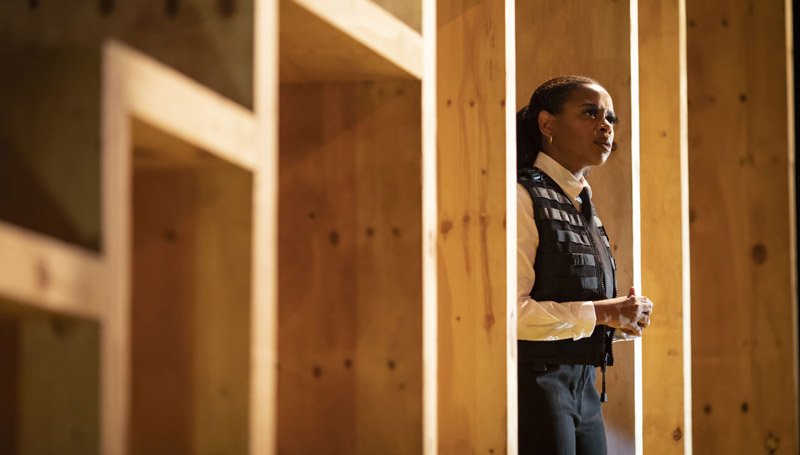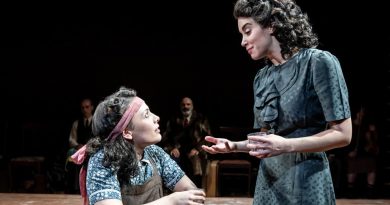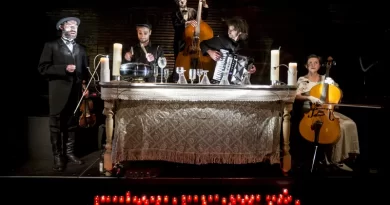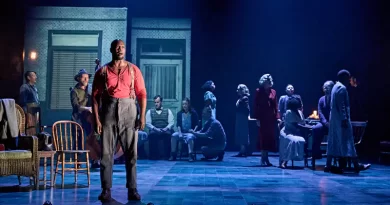“Out West”: Lyric Hammersmith
Jeremy Malies in west London
28 June 2021
Race runs through each of a trio of monologue plays by leading writers commissioned to reopen the Lyric Hammersmith under the umbrella title of Out West, a reference to all three stories being set in the immediate vicinity of this theatre in west London.
The first — The Overseas Student — begins in 1888 and sees a 19-year-old Mohandas Gandhi, played by Esh Alladi boarding a ship from Bombay bound for London. Playwright Tanika Gupta is obviously deeply interested in writing about Victorian Britain when India was the “jewel in the crown” of its empire: her 2013 play The Empress centred on Queen Victoria and the monarch’s intense relationship with Indian attendant Abdul Karim, while a couple of years ago her Raj-set version of lbsen’s A Doll’s House was premiered at Lyric Hammersmith.
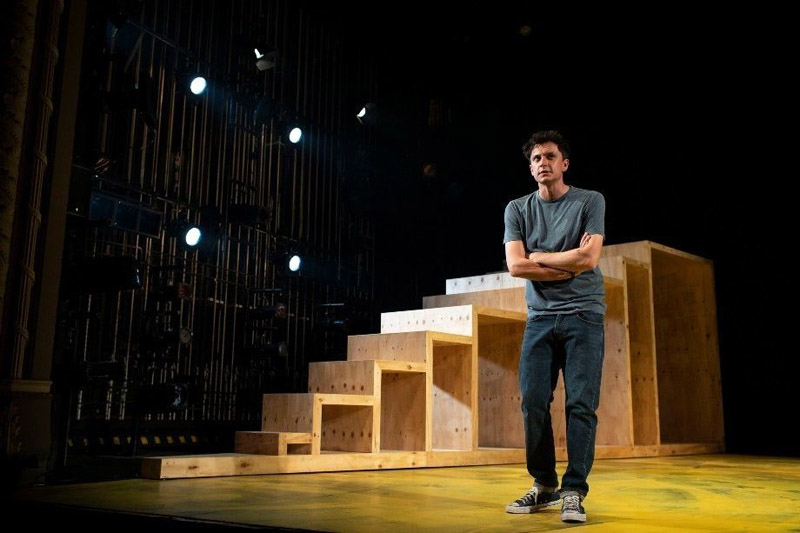
Tom Mothersdale in Blue Water and Cold and Fresh.
Photo credit: Helen Maybanks.
There’s racism (an overarching theme) from the off with Gandhi being told by a steward (with the exquisite politeness that he admires in the English) that he cannot take the air on a deck of the ship that is reserved for European passengers. This vegetarian teetotal aspiring lawyer has vowed not to touch meat, alcohol, or women. His abstinence on these counts — a vegetarian restaurant in Farringdon in central London is discovered with much joy — allows Gupta to demonstrate her trademark gossamer touch with humour.
A striking oversized wooden set by Soutra Gilmour in the form of a staircase proves versatile in serving as the ship and an abstract representation of the kind of social mountaineering a young Indian must do before he is accepted (tolerated perhaps) in polite circles. Here and in the other plays, we think of the wooden frame as doors — some open, some closed, some ajar. I enjoyed hearing how Mohandas revelled in seeing Henry Irving and Ellen Terry in As You Like It, and he also references Abdul Karim. There is just the right amount of background historical detail (he meets Annie Besant the socialist, secularist, and campaigner for Indian self-rule), but while keen to inform us, Gupta makes sure this never degenerates into an essay or mere character study.
Esh Alladi’s skills as a mimic and his considerable technical armoury propel his character through a true drama in which the other figures have great colour in our mind’s eye. The story is of course refracted through a post-colonial lens, and we know that however much Gandhi may be enjoying Shakespeare at the Lyceum, he will come to distrust Britain and subvert its control of his country. Gupta simply allows us to tumble to this realization for ourselves and she is never strident.

Ayesha Antoine in Go Girl.
Photo credit: Helen Maybanks.
The next heavyweight in this trio of playwrights is Simon Stephens working in collaboration with actor Emmanuella Cole whose Blue Water and Cold and Fresh shows Jack, a history teacher, walking through the ghost town that is lockdown London from Greenwich to Hammersmith in search of houses where he and his alcoholic father (who has died during the pandemic) once lived. It’s like lain Sinclair’s psychogeography diaries (including all the wit and sharp observation) but with added angst.
We know immediately that this was not a good father-son relationship and Jack (whose historical view as an academic is broad) relates that his father who also dabbled in history would spew ill-assorted facts about London’s wealth emanating from the colonies and how much of this can be defended. Almost as though the father were at his shoulder, there is discussion of our colonial past as it’s manifested in the names of pubs, roads, and stretches of the Thames. The casual racism of the father takes a chilling turn at the finale.
The backdrop isn’t just Covid; it’s the murder of George Floyd and the Black Lives Matter marches of 2020. Jack, played by Tom Mothersdale, has married Jennifer, a fellow teacher who is black. and they have a two-year-old son. (Jennifer’s ethnicity is part of a breadcrumb trail and is not revealed until quite late on.) There is more ambient racism described in incidents such as security guards focusing on Jennifer as the couple shop in department stores.
Jack (as you would expect from any Stephens creation) is a complex character who harbours a suspicion that he may have ingrained prejudices from his father, and while she is not mentioned we hover in the territory of Robin DiAngelo’s book White Fragility and what this woefully overrated academic identifies as racism among well-educated liberal elites.
There are some rambling and self-indulgent passages as son and imagined father discuss finer points of contemporary soccer that must have been incomprehensible to nearly every audience member. But Stephens’ dialogue and his use of figurative language hit fifth gear in detailed descriptions of Jack caring for his son with a tenderness that is tempered by pessimism about the prospects of a mixed-race child in contemporary London. And I couldn’t empathize with Jack more than when he describes observing members of the intelligentsia joining Black Lives Matter marches but hardly taking their eyes of their smartphones so keen are they to see what traction their Instagram posts are achieving.
The presentation could not be simpler; Mothersdale rarely strays from the apron of the stage and there is nothing by way of incidental music. lt’s raw in the positive sense. This is a wonderful cultural and socio-economic snapshot that may remain as a playlet or be expanded. As it stands, it’s ideal for festivals and I hope it will get many outings next year. And the explicit climactic piece of racism? It’s not exactly a plot twist but a turn of events that is best kept under wraps given that the piece is bound to be performed elsewhere in the future.
Go, Girl by Roy Williams stays with the topic of race but, like Stephens, the author never uses it gratuitously. The tone is brighter and there are many more laughs in this monologue. Ayesha Antoine plays Donna, a 30-year-old black security guard working at the enormous Westfield retail mall about a mile from Hammersmith.
Her modest claim to fame is that she was a pupil at the school in Islington, north London, visited by Michelle Obama in 2009, a visit that culminated with the first lady assuring the girls that they could be anything that they wanted to be.
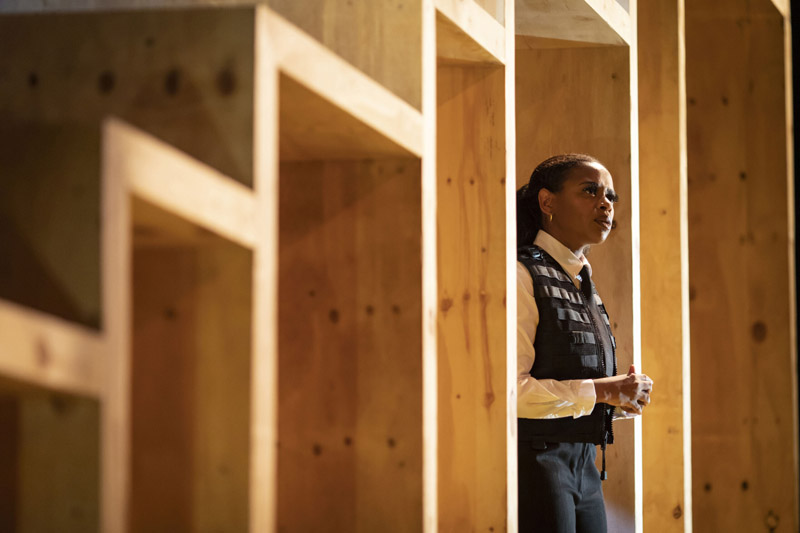
Ayesha Antoine in Go Girl.
Photo credit: Helen Maybanks.
It’s a bravura performance in which Antoine (relishing her ability to imitate the mannerisms of young people) conjures up her teenaged daughter who later performs an act of heroism. Donna often reflects on the visit by the First Lady and questions her own life choices which have seen her get pregnant at 15 and end up in a mundane but by no means worthless job. She is withering about a classmate, Danni, who has succeeded as an exploitative photographer mainly on the strength of a single picture in which she implied that young black girls in this part of London are part-feral and a “lost generation”. Donna complains: “She made us look like we were suffering.”
This could take us off into weighty sociological matters. Williams has many serious points to make but he avoids a polemic. A slanging match between Donna and Danni during a school reunion which due to Covid is held over Zoom becomes a gale of closely observed comedy but with the serious point that the children were falsely labelled. Donna’s perspective is broad; she isn’t self-pitying and she reflects that financial crashes, recession, and Covid have made the prospects for her daughter Tiana, now 14, much bleaker than her own back at the end of the noughties. Donna is currently on furlough while the mall is closed but she knows that however generous Chancellor of the Exchequer Rishi Sunak may seem, it’s Riana and her contemporaries who will bear the burden of her paid holiday.
This is the most lightweight monologue of the three but it moved me deeply. I had idled my afternoon before the performance by window shopping in Westfield, the very mall where Donna works. And the heroism performed by Riana? Less of a plot-spoiler this one: through courage and tenacity she saves a girl of her own age who is being preyed on by a paedophile. It explains the title, and having been on the point of a ding-dong battle with her daughter, the mother can reflect: “I’ve raised a warrior here.”
Exquisitely researched and crafted as it is, The Overseas Student is the play that is likely to have the shortest shelf life. I’m confident that in Go, Girl and Blue Water and Cold and Fresh, Rachel O’Riordan (artistic director of the Lyric Hammersmith and working as a co-director of these pieces with Diane Page) along with her dramaturg team have unearthed two contemporary equivalents of Alan Bennett’s Talking Heads that will be performed for decades to come.

